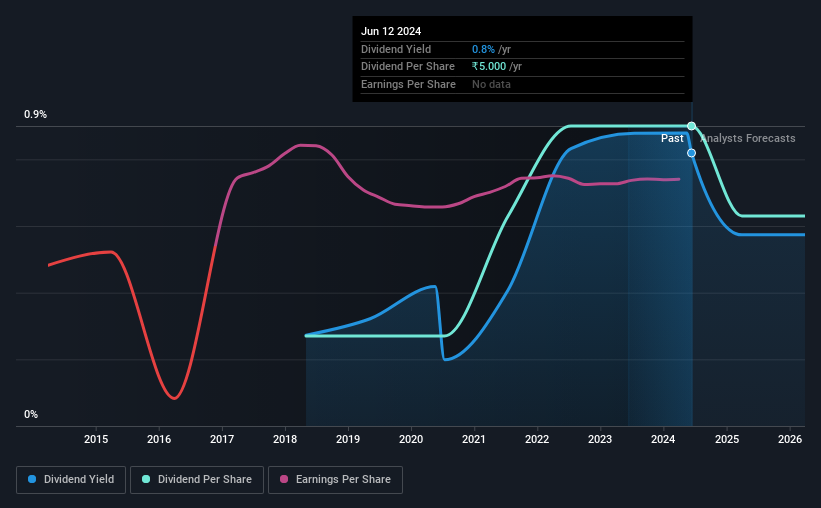- India
- /
- Interactive Media and Services
- /
- NSEI:MATRIMONY
Matrimony.com (NSE:MATRIMONY) Will Pay A Dividend Of ₹5.00
Matrimony.com Limited (NSE:MATRIMONY) has announced that it will pay a dividend of ₹5.00 per share on the 8th of September. This means the annual payment is 0.8% of the current stock price, which is above the average for the industry.
View our latest analysis for Matrimony.com
Matrimony.com's Payment Has Solid Earnings Coverage
Impressive dividend yields are good, but this doesn't matter much if the payments can't be sustained. Before making this announcement, Matrimony.com was easily earning enough to cover the dividend. This means that most of what the business earns is being used to help it grow.
Over the next year, EPS is forecast to expand by 52.1%. If the dividend continues along recent trends, we estimate the payout ratio will be 18%, which is in the range that makes us comfortable with the sustainability of the dividend.

Matrimony.com Doesn't Have A Long Payment History
Even though the company has been paying a consistent dividend for a while, we would like to see a few more years before we feel comfortable relying on it. Since 2018, the annual payment back then was ₹1.50, compared to the most recent full-year payment of ₹5.00. This means that it has been growing its distributions at 22% per annum over that time. Matrimony.com has been growing its dividend quite rapidly, which is exciting. However, the short payment history makes us question whether this performance will persist across a full market cycle.
Matrimony.com May Find It Hard To Grow The Dividend
Some investors will be chomping at the bit to buy some of the company's stock based on its dividend history. Earnings has been rising at 3.6% per annum over the last five years, which admittedly is a bit slow. Earnings growth is slow, but on the plus side, the dividend payout ratio is low and dividends could grow faster than earnings, if the company decides to increase its payout ratio.
In Summary
Overall, we think Matrimony.com is a solid choice as a dividend stock, even though the dividend wasn't raised this year. The dividend has been at reasonable levels historically, but that hasn't translated into a consistent payment. The payment isn't stellar, but it could make a decent addition to a dividend portfolio.
It's important to note that companies having a consistent dividend policy will generate greater investor confidence than those having an erratic one. However, there are other things to consider for investors when analysing stock performance. For example, we've picked out 1 warning sign for Matrimony.com that investors should know about before committing capital to this stock. If you are a dividend investor, you might also want to look at our curated list of high yield dividend stocks.
New: Manage All Your Stock Portfolios in One Place
We've created the ultimate portfolio companion for stock investors, and it's free.
• Connect an unlimited number of Portfolios and see your total in one currency
• Be alerted to new Warning Signs or Risks via email or mobile
• Track the Fair Value of your stocks
Have feedback on this article? Concerned about the content? Get in touch with us directly. Alternatively, email editorial-team (at) simplywallst.com.
This article by Simply Wall St is general in nature. We provide commentary based on historical data and analyst forecasts only using an unbiased methodology and our articles are not intended to be financial advice. It does not constitute a recommendation to buy or sell any stock, and does not take account of your objectives, or your financial situation. We aim to bring you long-term focused analysis driven by fundamental data. Note that our analysis may not factor in the latest price-sensitive company announcements or qualitative material. Simply Wall St has no position in any stocks mentioned.
About NSEI:MATRIMONY
Matrimony.com
A consumer internet company, provides online matchmaking services on internet and mobile platforms in India and internationally.
Flawless balance sheet with moderate growth potential.
Market Insights
Community Narratives



